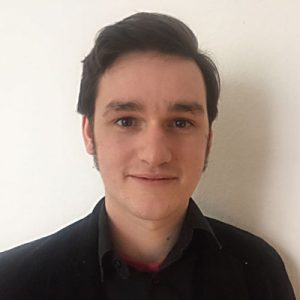By Kit Holden
Back in the summer, the fishermen used to say that it felt more like going into a city than going out to sea. When construction began to get underway at the German end of Nord Stream II, the Bay of Greifswald was teeming with industrial activity. The works were so loud, say some, that you could hear them several kilometres away on land.
Now the autumn has set in, it is quiet around Lubmin, where the controversial offshore pipeline in the Baltic Sea reaches the shores of Germany. Construction has rattled along, even as the political battles over pipeline continue.
Trade issue or geopolitical scandal?
The first Nord Stream pipeline, inaugurated in 2011, also lands here, and the second pipeline is set to double the amount of gas flowing from Russia to Germany via the Baltic coast. What Germany sees as a simple trade issue, many of her European allies perceive to be a geopolitical scandal.
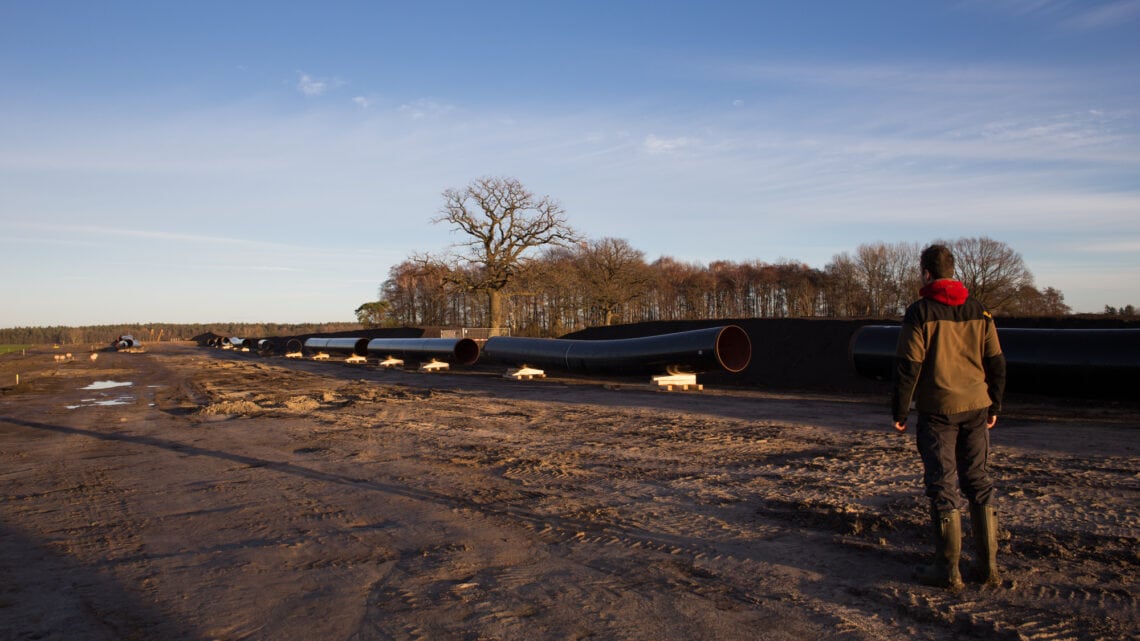
Yet as she goes for her evening walk on the pier, 89-year-old Mrs. Göttler* says she is not worried about Russia holding influence over her.
“It’s quite exciting, not much happens around here normally,” says Mrs. Göttler. “One of my neighbours met one of the people who works on the ships, and they explained to me exactly how all the pipes were laid. I think it’s incredible, the modern technology.”
“This is the former East Germany,” she says. “We don’t like the way they treat Russia. Putin is one of the reasonable ones, how can they treat him like that? He hasn’t done anything.”
Who “they” are exactly remains somewhat unclear. Mrs. Göttler is, for her part, equally happy with the EU, which she says is a force for good, but it doesn’t bother her that Germany’s EU neighbours are concerned about the pipeline. Jaroslaw Kaczynski, leader of Poland’s ruling PiS party, is “always just moaning anyway”.
Public resistance remains low
Most people in Lubmin are equally unfazed by Nord Stream II. In an interview with Politico, Lubmin mayor Axel Vogt (CDU) said that the Lubmin harbour would “profit a great deal from Nord Stream”, pointing to a boom in hotel custom and increased business tax revenue.
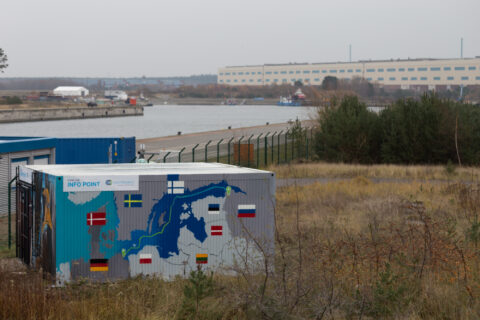
Nor are ecological concerns high on many people’s priorities. In a town which was once home to East Germany’s largest nuclear power plant, most are happy with Nord Stream’s own arguments that the EU needs the extra gas supply, and that gas is the least harmful of all the fossil fuels.
“What else do you go for? Wind?” asks Dietrich Ladwig, a sixty-something Lubmin resident. “They just built another offshore wind farm out there, I don’t know if that looks good, or if it’s good for the fish.”
“We’re not very green around here,” he laughs, sweeping the leaves off the pavement in front of Cafe Südwind, just up from the pier. “You won’t find many in Lubmin who are against Nord Stream.”
Yet there are some. Not everyone is happy with it, and many do put ecological questions above green concerns. Playing with her grandson on the end of the pier, Jotte Fitzler says that she can’t understand why so many countries have allowed the pipeline to be built. Despite the disgruntlement among EU countries, almost all of the nations who had to give permission for the pipeline to be laid in their waters have acquiesced. Denmark remains the only exception. A Lubminer by birth, Fitzler also thinks little of the argument that the pipeline will bring economic benefits.
“You can’t just put jobs first all the time,” she says. “When you’re sacrificing nature to do so, then you have to stop.”
The extent of harm to the natural environment remains unknown
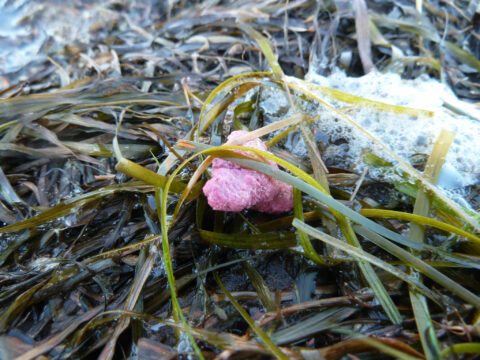
The question of harm to the natural environment has been the one thing which has prompted some resistance to Nord Stream, both in Lubmin and in nearby Greifswald. In June, the Greifswald chapter of the Nature Protection Association (NABU) were alerted to peculiar lumps of pink grease that were appearing on beaches further up the bay in Wampen.
Upon investigation, the NABU discovered that the problem was widespread, and determined that the oily lumps, which smelled strongly of petrol, had come from a Nord Stream dredger and been blown onshore by a strong east wind. Nord Stream eventually assumed responsibility for clearing the beaches, but only after sustained pressure. It was ten days before they actually began to clean the beaches, by which time the greasy lumps had broken down further, making the job more difficult, says Lena Haeberlein from the Greifswald NABU.
“We don’t know the extent of the effect on the ecosystem,” says Haeberlein. “The Bay of Greifswald is sensitive anyway, and it was at the limits of what it could withstand after such a ferocious summer.”
Yet even the greasy beaches didn’t spark enormous public outcry. In the beginning, only the regional newspaper Nordkurier picked up the story. It was only when the issue got wider media coverage that things began to move, says Haeberlein. “Had we not been so stubborn about it, the issue would probably have been overlooked.”
The NABU have been stubborn on a national level as well, lodging various, as of yet unsuccessful legal challenges to try and stop the pipeline being laid on conservationist grounds. Yet as Haeberlein puts it, it is something of a “David and Goliath” scenario, and the biggest hope for Nord Stream opponents is probably a mooted change to the EU’s gas regulations.
At the local level, Haeberlein says, there has been little communication with conservationist groups from other Baltic Sea countries; the networks simply aren’t there. Yet even with their hyperlocal fight to clean the beaches, the NABU Greifswald have alerted some to the wider debate around Nord Stream II.
Finding a solution on a European level
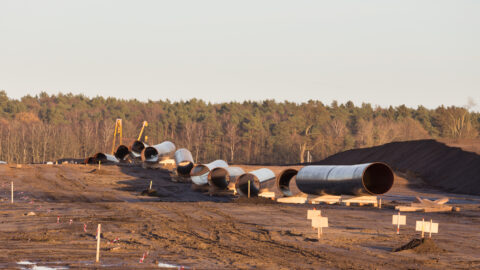
“The politics of it don’t bother me much, but the thing with the grease was bad, and to be honest, I’m against the building of pipelines in general,” says Enrico Henschel, a twenty-something Greifswald resident. “We should be investing in renewables energies.”
That, he says, is something that should be happening not just in Germany, but on a European level as well.
“We have to tackle the problem together. Germany has always been the pioneer (on green issues) and the others are catching up now. I think if we managed to get these things done properly on a European level, then others would join in too.”
*Full name not given
—
Kit Holden is a British journalist based in Berlin. He is a member of the „Wir sind Europa“ base group.
Fotos: Philipp Schroeder
